Spiritual Retreats and Workshops: A Journey of Self-Discovery
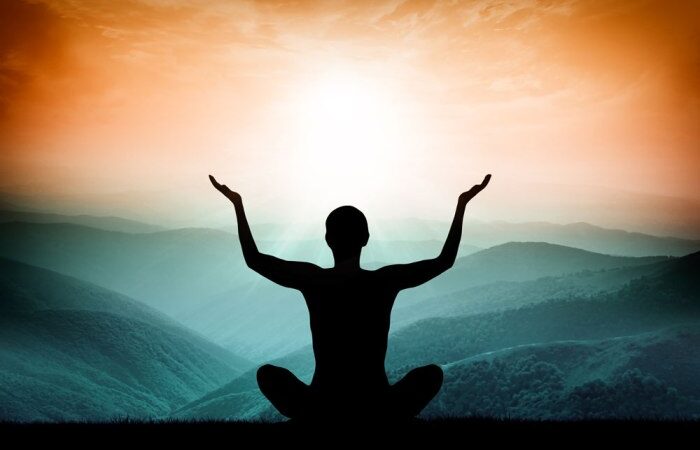
Spiritual retreats and workshops have witnessed a surge in popularity in recent years, offering individuals a sanctuary for personal growth, stress reduction, and a deeper connection to their inner selves. This growing trend is fueled by a collective yearning for meaning, a desire to escape the relentless pace of modern life, and a quest for inner peace.
From yoga retreats amidst breathtaking landscapes to silent meditation retreats fostering profound introspection, the spectrum of retreats and workshops is diverse. Whether seeking to cultivate mindfulness, explore spiritual practices, or simply reconnect with nature, these immersive experiences provide a unique opportunity for self-reflection and transformation.
The Rise of Spiritual Retreats and Workshops
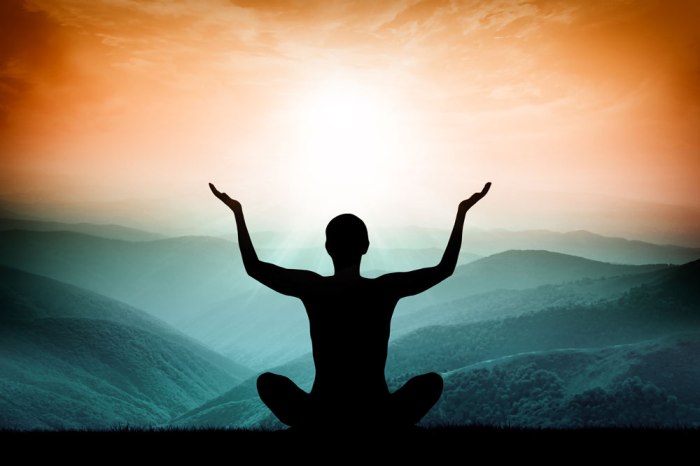
In recent years, there has been a surge in the popularity of spiritual retreats and workshops, with individuals seeking a deeper connection to themselves, their purpose, and the world around them. This trend reflects a growing need for inner peace, personal growth, and a sense of meaning in a world often characterized by stress, uncertainty, and superficiality.
Factors Driving the Trend, Spiritual retreats and workshops
The increasing popularity of spiritual retreats and workshops can be attributed to a confluence of factors.
- Increased Stress and Anxiety: Modern life is filled with demands, pressures, and constant stimulation, leading to heightened stress and anxiety levels. Spiritual practices, such as meditation and mindfulness, offer tools to manage stress and cultivate inner peace.
- Search for Meaning and Purpose: Many individuals are seeking a sense of purpose and meaning beyond their daily routines and material pursuits. Spiritual retreats provide a space for introspection, self-discovery, and exploring deeper questions about life’s meaning.
- Desire for Personal Growth: Spiritual retreats and workshops often offer programs designed to foster personal growth, self-awareness, and emotional intelligence. These programs provide tools and techniques for overcoming limiting beliefs, developing emotional resilience, and enhancing personal well-being.
Types of Retreats and Workshops
The world of spiritual retreats and workshops offers a diverse range of experiences, catering to different needs and interests.
- Yoga Retreats: These retreats combine yoga practices with other elements like meditation, healthy eating, and nature immersion. They focus on physical, mental, and spiritual well-being.
- Meditation Retreats: Meditation retreats provide a structured environment for deepening meditation practice. They often involve guided meditations, silent retreats, and teachings on mindfulness and concentration.
- Mindfulness Workshops: Mindfulness workshops offer practical tools and techniques for cultivating present-moment awareness and reducing stress. They are often short-term programs that can be incorporated into daily life.
- Spiritual Development Programs: These programs explore various spiritual traditions, philosophies, and practices, providing insights into different ways of understanding the world and one’s place in it. They may involve workshops, lectures, group discussions, and personal reflection.
Benefits of Attending Spiritual Retreats and Workshops

Spiritual retreats and workshops offer a unique opportunity for personal growth and transformation. These immersive experiences provide a sanctuary for introspection, self-discovery, and a deeper connection with one’s inner self. By stepping away from the demands of daily life, individuals can tap into their spiritual potential and cultivate a sense of peace, purpose, and well-being.
Stress Reduction and Relaxation
Spiritual retreats and workshops often incorporate practices that promote relaxation and stress reduction. These practices can include meditation, yoga, mindfulness exercises, and deep breathing techniques. By calming the mind and body, these practices help individuals manage stress, reduce anxiety, and improve overall well-being.
Improved Mental Clarity and Focus
The quiet and contemplative nature of spiritual retreats provides an ideal environment for improving mental clarity and focus. The absence of distractions allows individuals to quiet their minds, gain insights, and develop a greater sense of mental peace.
Enhanced Self-Awareness and Personal Growth
Spiritual retreats and workshops encourage self-reflection and introspection. Through guided meditations, journaling, and group discussions, participants gain a deeper understanding of their thoughts, feelings, and beliefs. This enhanced self-awareness fosters personal growth and allows individuals to identify areas for positive change.
Deeper Spiritual Connection
These retreats and workshops offer opportunities for individuals to explore their spirituality and connect with a higher power. Through practices such as prayer, chanting, and spiritual readings, participants can deepen their faith, find meaning in life, and cultivate a sense of purpose.
Cultivating a Sense of Purpose
By taking time for introspection and reflection, individuals can gain a clearer understanding of their values, passions, and life goals. Spiritual retreats and workshops provide a supportive environment for individuals to explore their purpose and align their actions with their values.
Choosing the Right Retreat or Workshop
Selecting the right retreat or workshop is crucial to ensure a fulfilling and meaningful experience. Consider your needs, goals, and preferences when making your decision.
Factors to Consider
Before choosing a retreat or workshop, it’s essential to consider several key factors to ensure a positive and enriching experience.
| Factor | Description |
|---|---|
| Location | The location of the retreat or workshop can significantly impact your experience. Consider the environment, accessibility, and overall atmosphere. Do you prefer a serene mountain setting, a bustling city, or a peaceful beach? |
| Duration | Retreats and workshops vary in length, from weekend getaways to week-long immersive experiences. Choose a duration that aligns with your schedule and commitment level. |
| Cost | The cost of retreats and workshops can vary widely depending on factors such as location, program type, and accommodation. Set a budget and research options within your price range. |
| Type of Program | Retreats and workshops offer a diverse range of programs, including yoga, meditation, mindfulness, spiritual exploration, and personal growth. Select a program that resonates with your interests and goals. |
| Facilitator Reputation | The facilitator’s expertise, experience, and approach play a crucial role in the effectiveness of the retreat or workshop. Research the facilitator’s background, qualifications, and testimonials from past participants. |
Research and Evaluation
To ensure a fulfilling and meaningful experience, it’s important to thoroughly research and evaluate different options.
- Read Reviews and Testimonials: Explore online reviews and testimonials from previous participants to gain insights into the facilitator’s style, program content, and overall experience.
- Visit the Website: Review the retreat or workshop website for detailed information about the program, schedule, accommodation, and facilitator.
- Contact the Organizer: Don’t hesitate to contact the organizer with any questions you may have. Ask about the program structure, group size, and any specific requirements.
- Consider Your Personal Needs: Reflect on your personal needs and goals. What are you hoping to gain from the retreat or workshop? Consider your comfort level with group settings, your preferred learning style, and any specific requirements you may have.
The Experience of a Spiritual Retreat or Workshop: Spiritual Retreats And Workshops
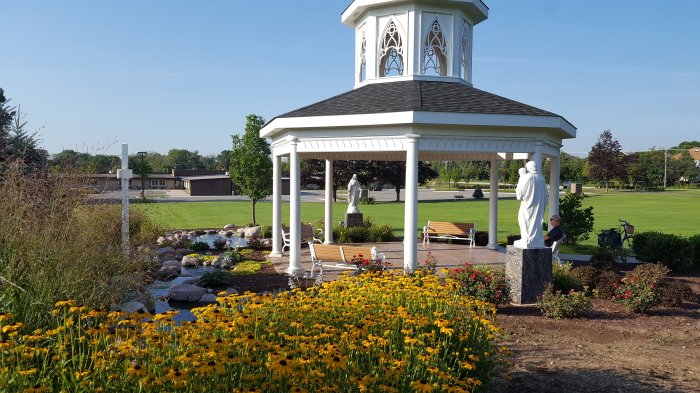
Stepping into a spiritual retreat or workshop is like entering a sanctuary where you can reconnect with yourself and explore your inner world. These immersive experiences offer a unique blend of structured activities and personal reflection time, allowing you to cultivate a deeper sense of peace, purpose, and connection.
Typical Structure and Activities
Spiritual retreats and workshops are designed to provide a holistic experience, often encompassing a variety of activities that support personal growth and spiritual exploration.
- Guided Meditations: These sessions provide a structured framework for quieting the mind, focusing on the present moment, and cultivating mindfulness. Guided meditations often incorporate visualizations, breathwork, and affirmations to promote relaxation, clarity, and inner peace.
- Yoga Sessions: Yoga practices, ranging from gentle Hatha to dynamic Vinyasa, integrate physical movement, breathwork, and mindfulness to enhance flexibility, strength, and overall well-being. Yoga can help release tension, improve posture, and cultivate a sense of grounding and body awareness.
- Group Discussions: These interactive sessions provide a safe space for participants to share their experiences, insights, and challenges. Facilitators often guide discussions around specific themes, encouraging open communication, empathy, and a sense of community.
- Personal Reflection Time: Retreats and workshops often include dedicated time for journaling, contemplation, and quiet introspection. This time allows individuals to process their experiences, gain clarity, and integrate the teachings into their daily lives.
- Nature Walks: Connecting with nature can be a powerful way to enhance mindfulness, reduce stress, and foster a sense of awe and wonder. Retreats often incorporate nature walks, allowing participants to appreciate the beauty of their surroundings and experience a sense of peace and renewal.
Emotional and Spiritual Transformations
The transformative nature of spiritual retreats and workshops lies in their ability to create a space for deep introspection and personal growth.
- Increased Self-Awareness: The structured activities and reflective time allow individuals to gain a deeper understanding of their thoughts, emotions, and behaviors. This heightened self-awareness can lead to greater clarity about their values, motivations, and life purpose.
- Reduced Stress and Anxiety: The combination of mindfulness practices, physical activity, and a supportive community can help reduce stress, anxiety, and feelings of overwhelm.
- Enhanced Emotional Regulation: Retreats and workshops often provide tools and techniques for managing emotions effectively, fostering resilience and emotional balance.
- Spiritual Awakening: For some individuals, these experiences can trigger a profound spiritual awakening, leading to a deeper connection to their inner self, a sense of purpose, and a renewed appreciation for life.
Types of Retreat Experiences
Spiritual retreats and workshops come in a wide variety of formats, each catering to different needs and preferences.
| Type of Retreat | Description | Example Activities |
|---|---|---|
| Silent Retreat | Focuses on deep introspection and inner silence, with minimal external stimulation. | Meditation, contemplation, journaling, solo walks. |
| Active Retreat | Incorporates physical activities and outdoor adventures to enhance mindfulness and well-being. | Yoga, hiking, kayaking, dance workshops. |
| Community-Based Retreat | Emphasizes connection and shared experiences, fostering a sense of belonging and support. | Group discussions, community service projects, communal meals. |
Integrating Retreat Experiences into Daily Life
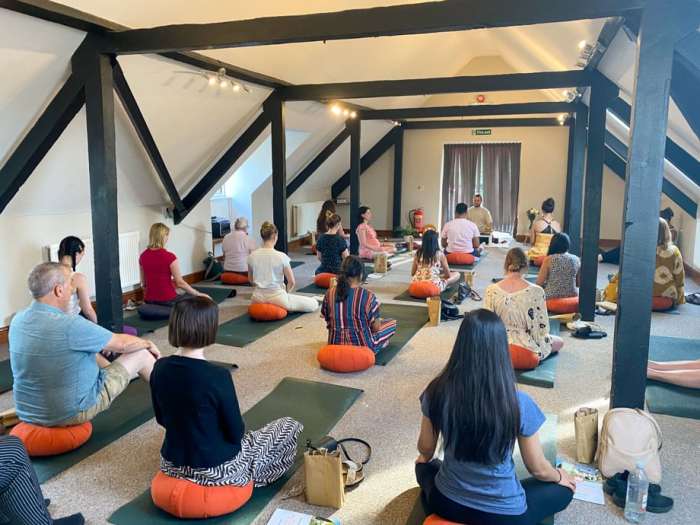
A spiritual retreat offers a unique opportunity to delve into introspection, explore new perspectives, and cultivate practices that can enhance our well-being. However, the true value of a retreat lies in our ability to integrate these experiences into our daily lives.
The transition from the retreat’s serene environment to the demands of everyday life can be challenging, but with intention and effort, we can successfully bridge the gap and sustain the benefits gained.
Mindfulness Techniques
Mindfulness is a cornerstone of many spiritual practices, fostering a heightened awareness of the present moment. By cultivating mindfulness, we can navigate daily challenges with greater clarity, reduce stress, and enhance our connection to ourselves and the world around us.
Here are some mindfulness techniques that can be incorporated into daily routines:
- Mindful Breathing: Take a few moments throughout the day to focus on your breath. Observe the rise and fall of your chest or abdomen, noticing the sensation of each inhale and exhale.
- Body Scan Meditation: Starting from your toes, slowly bring your attention to each part of your body, noticing any sensations, such as warmth, tingling, or pressure.
- Mindful Walking: Pay attention to the sensations of your feet on the ground, the movement of your body, and the sights and sounds around you as you walk.
Self-Reflection Exercises
Regular self-reflection is essential for personal growth and understanding. Retreats often provide a structured environment for deep introspection, and these practices can be continued in daily life.
- Journaling: Set aside time each day to write down your thoughts, feelings, and experiences. Reflect on your day, noting moments of joy, gratitude, and areas for growth.
- Guided Meditation: There are many guided meditations available online or through apps that can facilitate deeper self-reflection and exploration.
- Gratitude Practice: Take a few minutes each day to acknowledge the things you are grateful for, big or small. This practice can shift your focus towards the positive and cultivate a sense of contentment.
Maintaining a Sense of Peace and Connection
Sustaining the peace and connection cultivated during a retreat requires conscious effort and commitment. Here are some strategies to maintain this sense of well-being:
- Create a Sacred Space: Designate a specific area in your home as a space for meditation, reflection, or prayer. This can be a quiet corner, a comfortable chair, or a dedicated altar.
- Practice Gratitude: Cultivate a daily gratitude practice by writing down things you are grateful for or expressing gratitude to others.
- Connect with Nature: Spend time in nature, whether it’s a walk in the park, a hike in the woods, or simply sitting in your garden. Nature has a calming and restorative effect on the mind and body.
- Engage in Meaningful Activities: Pursue activities that align with your values and bring you joy. This could include volunteering, creative pursuits, or spending time with loved ones.
The Future of Spiritual Retreats and Workshops
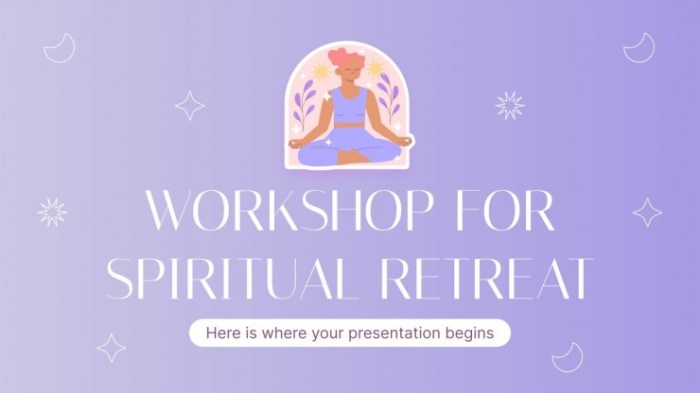
The landscape of spiritual retreats and workshops is evolving rapidly, driven by a growing interest in personal growth and well-being. As society grapples with increasing stress and complexity, the demand for these transformative experiences is only expected to rise. This evolution is marked by the integration of technology, personalized approaches, and specialized retreats tailored to specific needs.
The Integration of Technology
The integration of technology into spiritual retreats and workshops offers exciting possibilities for enhancing the experience and expanding accessibility. Online platforms and virtual reality (VR) applications can provide immersive experiences, connecting individuals with spiritual practices and teachings from anywhere in the world.
- Virtual Retreats: Online platforms offer a convenient and affordable way to participate in guided meditations, yoga classes, and workshops, bridging geographical limitations and fostering global communities. For instance, apps like Insight Timer and Headspace offer a wide range of guided meditations and mindfulness practices, accessible anytime and anywhere.
- VR Immersive Experiences: VR technology can transport individuals to serene virtual environments, enhancing meditation and mindfulness practices. VR applications like “The Meditation Room” and “Mindfulness VR” create immersive experiences that can promote relaxation and inner peace.
- Personalized Learning: Technology can facilitate personalized learning paths, tailoring content to individual needs and preferences. AI-powered platforms can analyze user data to recommend relevant practices and resources, creating a more customized and engaging experience.
Personalized Retreats
The growing emphasis on individual needs and preferences is driving the rise of personalized retreats. These retreats offer tailored experiences, catering to specific interests, goals, and spiritual inclinations.
- Customized Curriculums: Retreat organizers are increasingly designing customized curriculums based on individual needs and aspirations. This allows participants to focus on specific areas of personal growth, such as relationships, career development, or spiritual exploration.
- One-on-One Guidance: Personalized retreats often include one-on-one guidance from experienced facilitators or mentors, providing personalized support and insights. This individualized approach can help participants delve deeper into their journeys and achieve greater clarity and transformation.
- Small Group Retreats: Smaller, more intimate retreats allow for personalized attention and a deeper sense of connection among participants. These retreats often focus on specific themes or practices, creating a shared experience that fosters deeper understanding and support.
Retreats Focused on Specific Needs
As societal pressures increase, the demand for retreats addressing specific needs, such as grief, burnout, and trauma, is on the rise. These specialized retreats provide a safe and supportive environment for individuals to process challenging emotions, build resilience, and find healing.
- Grief Retreats: These retreats offer a space for individuals to grieve, heal, and find solace in the company of others who understand their pain. Through group support, therapeutic practices, and spiritual guidance, participants can navigate the complex emotions associated with loss and find pathways to healing.
- Burnout Retreats: Retreats designed to address burnout focus on stress management, self-care, and restoring balance in life. Through mindfulness practices, restorative activities, and workshops on healthy boundaries, participants can learn to manage stress, prioritize well-being, and regain a sense of purpose.
- Trauma-Informed Retreats: These retreats provide a safe and supportive environment for individuals who have experienced trauma. They incorporate trauma-informed practices, such as mindfulness, somatic experiencing, and art therapy, to help participants process trauma, develop coping mechanisms, and build resilience.
Last Point

Embarking on a spiritual retreat or workshop can be a life-changing experience, offering a profound opportunity to reconnect with your inner self, cultivate mindfulness, and discover a deeper sense of purpose. By integrating the practices and insights gained into your daily life, you can cultivate a more fulfilling and meaningful existence.
Whether you’re seeking solace, growth, or a renewed sense of connection, these retreats and workshops provide a pathway to personal transformation and a deeper understanding of yourself and the world around you.
Comments are closed.